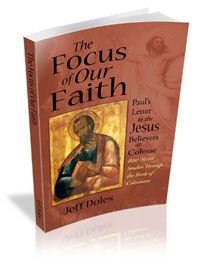Therefore I also, after I heard of your faith in the Lord Jesus and your love for all the saints, do not cease to give thanks for you, making mention of you in my prayers: that the God of our Lord Jesus Christ, the Father of glory, may give to you the spirit of wisdom and revelation in the knowledge of Him. (Ephesians 1:15-17)
The apostle Paul realized there is much believers need to understand, but as eloquent a teacher as he was, he knew such skills would not be enough. It is one thing to grasp a theological point with the mind, quite another to know a spiritual truth with the heart. It requires wisdom and revelation from God, the Holy Spirit teaching these things to the inner man of the heart. So that is what Paul prayed, that the Father of glory would grant us wisdom and revelation by the Holy Spirit, so that we would know Him more and more, deeply and intimately.
The eyes of your understanding being enlightened; that you may know what is the hope of His calling, what are the riches of the glory of His inheritance in the saints, and what is the exceeding greatness of His power toward us who believe, according to the working of His mighty power which He worked in Christ when He raised Him from the dead and seated Him at His right hand in the heavenly places, far above all principality and power and might and dominion, and every name that is named, not only in this age but also in that which is to come. (Ephesians 1:18-21)The “eyes of your understanding” refers, not to intellectual knowledge, but an experience of the heart. Some early Greek manuscripts even have the word for “heart,” kardias, here. It is an understanding mediated to our spirit by the Spirit of God. He gives us light so we can see, to know who we are in Jesus Christ and what we have in Him.
- The Hope of His calling. What it is God has called us to — the positive expectation, the joyful anticipation we have in Him. God reveals a mystery to us, which is Christ in us, the “hope of glory” (Colossians 1:27).
- The riches of the glory of His inheritance. We are “joint-heirs” with Jesus Christ (Romans 8:17). Whatever He receives for the Father, we receive with Him. We have received “every spiritual blessing in the heavenlies” (Ephesians 1:3), which is the basis for every other blessing.
- The greatness of His mighty power toward us. We have the benefit of God’s power at work on our behalf. This is the same power by which God raised Jesus from the dead and seated Him at His right hand in the heavenlies—and us there with Him (Ephesians 2:6) — far above every other power in heaven and earth. God is able to do “exceedingly abundantly above all that we ask or think, according to the power that works in us” (Ephesians 3:20). This divine power is now at work in us.
The Table of the Lord is the Table of Wisdom and Revelation.


